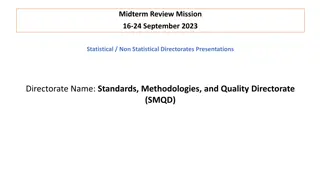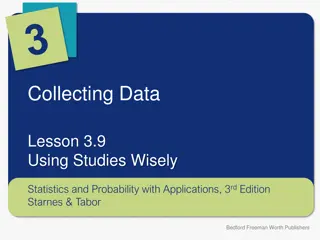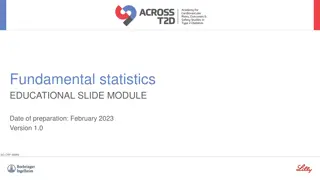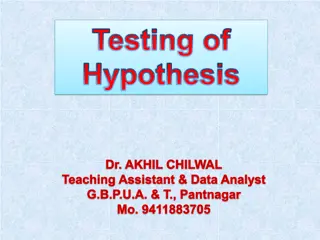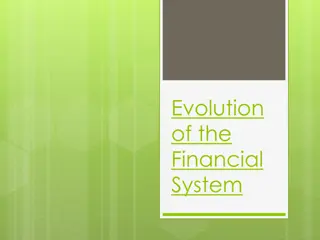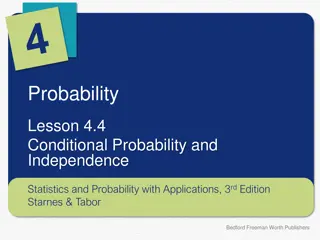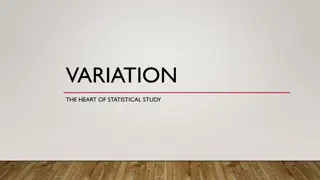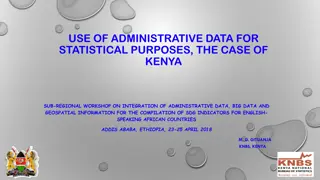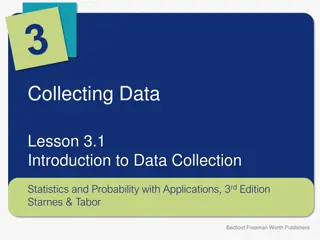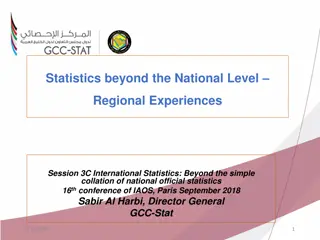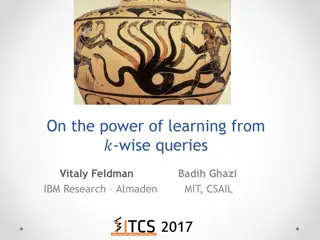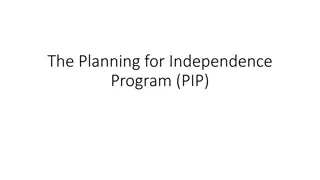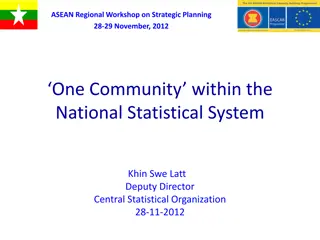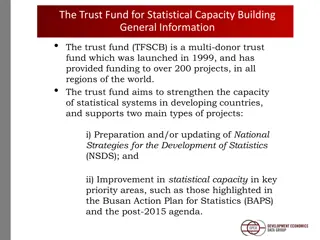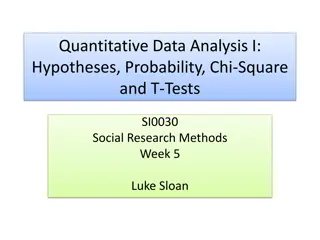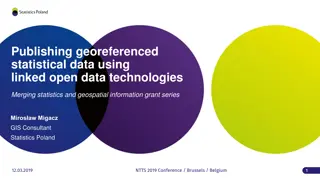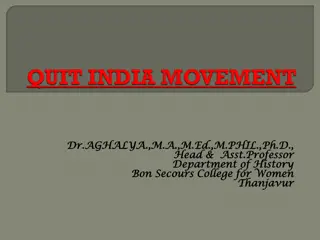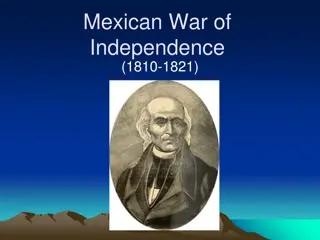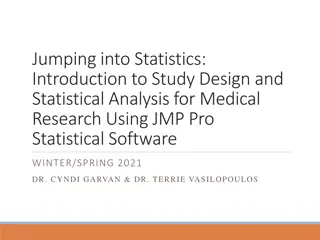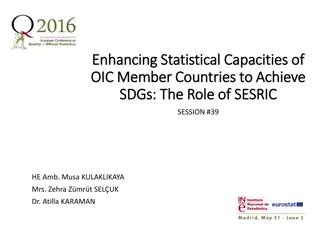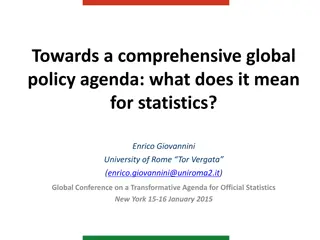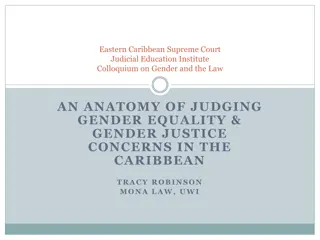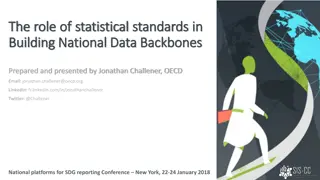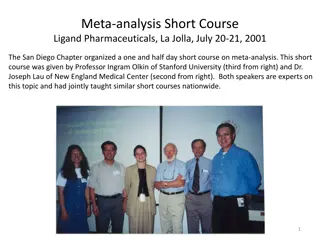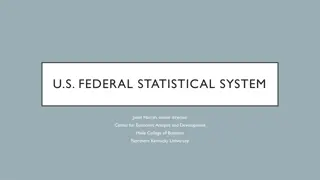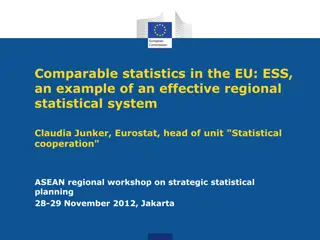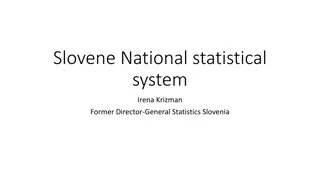Standards, Methodologies, and Quality in Statistical Programs and Services
This presentation highlights the role of the Standards, Methodologies, and Quality Directorate in overseeing statistical programs and services. It covers topics such as quality assurance, sampling frames, statistical classifications, and user satisfaction surveys. The directorate collaborates with v
1 views • 13 slides
Biostatistician Expert Offering Statistical Support and Training at CAMH
Marcos Sanches is a biostatistician at Biostatistic Core, CAMH, dedicated to enhancing the statistical quality of research projects. With expertise in various study designs, statistical techniques, and software, Marcos provides support throughout the project lifecycle, from grant applications to dat
5 views • 7 slides
Ireland's Engagement with the League of Nations: Path to Independence
Ireland's entry into the League of Nations in 1923 marked a significant step towards independence after the War of Independence and Civil War. Through joining the League and asserting its independence, Ireland demonstrated its readiness to participate in global initiatives for peace and cooperation.
4 views • 17 slides
Understanding the Scope of Inference in Statistical Studies
Statistical studies require careful consideration of the scope of inference to draw valid conclusions. Researchers need to determine if the study design allows generalization to the population or establishes cause and effect relationships. For example, a study on the effects of cartoons on children'
0 views • 15 slides
Understanding Statistical Methods for Clinical Endpoints in Diabetes Research
This educational slide module delves into fundamental statistics for analyzing clinical endpoints in diabetes research. It covers the choice of statistical methods, the distinction between statistical and clinical significance, and the importance of different endpoints in evaluating clinical benefit
1 views • 37 slides
Understanding Hypothesis Testing in Statistical Analysis
Statistical analysis aims to make inferences about populations based on sample data. Hypothesis testing is a crucial aspect where decisions are made regarding accepting or rejecting specific values or parameters. Statistical and parametric hypotheses, null hypotheses, and decision problems are key c
1 views • 34 slides
Evolution of the Indian Financial System: A Historical Perspective
The Indian Financial System has evolved through distinct phases - Pre-Independence, Post-Independence up to 1991, and post-1991. Pre-Independence saw a closed economy with limited access to foreign savings. Post-Independence witnessed significant growth, nationalization of banks and insurance, devel
0 views • 20 slides
Statistics for Managers: A Comprehensive Course Overview
This course aims to equip managers with statistical skills to analyze data effectively and make informed decisions in various management areas. It covers topics such as measures of central tendency, statistical models, and the importance of statistical analysis in improving business decisions. The i
1 views • 15 slides
Understanding Conditional Probability and Independence in Statistics
Conditional probability and independence are essential concepts in statistics. This lesson covers how to find and interpret conditional probabilities using two-way tables, calculate probabilities using the conditional probability formula, and determine the independence of events. Through examples li
0 views • 15 slides
Understanding Degrees of Freedom in Statistical Models
Exploring the concept of degrees of freedom in statistical modeling, this presentation discusses the importance of having adequate degrees of freedom for model fitting and interpretation. It compares different models with varying degrees of freedom, illustrating how a null model with zero parameters
0 views • 27 slides
Understanding Variation in Statistical Studies
Variability is key in statistical studies, shaping the essence of statistical analysis. Students often struggle to grasp the concept of variability, despite being taught statistical methods. The term "variation" takes on different meanings in various statistical contexts, presenting challenges in co
1 views • 54 slides
Utilizing Administrative Data for Statistical Analysis in Kenya's National Statistical System
Kenya National Bureau of Statistics (KNBS) employs administrative data for statistical purposes, as highlighted in the sub-regional workshop on integrating administrative data, big data, and geospatial information for compiling SDG indicators. The legal and institutional framework, data collection m
0 views • 21 slides
Introduction to Data Collection & Statistics: Understanding Statistical Questions, Population, and Sampling
This material introduces the fundamental concepts of data collection and statistics. Learning objectives include distinguishing statistical questions, identifying populations and samples, and understanding the difference between observational studies and experiments. It discusses the process of stat
0 views • 14 slides
Enhancing Regional Integration Through Statistical Collaboration in the GCC
Regional statistics play a crucial role in informing regional policies, monitoring progress, and assessing developmental outcomes. The Gulf Cooperation Council (GCC) has established GCC-Stat as a regional statistics center to meet statistical requirements at the GCC level. By improving regional data
7 views • 8 slides
Exploring the Power of Wise Queries in Statistical Learning
Dive into the world of statistical learning with a focus on the impact of wise queries. Discover how statistical problems are approached, the significance of statistical queries, and the comparisons between wise and unary queries. Explore the implications for PAC learning and uncover key insights in
0 views • 8 slides
Best Practices for Independence in Implementing FASB ASC 606
Independence considerations are crucial when assisting attest clients with FASB ASC 606 implementation. General requirements and dos and don'ts must be followed to maintain independence. Factors to assess independence include client responsibility, training provided, and extent of involvement. Audit
0 views • 6 slides
Planning for Independence Program (PIP) - Empowering Students for Success
Our Planning for Independence Program (PIP) offers a 7-year alternative program to students with Intellectual Developmental Exceptionality. Through individualized education programs, students develop necessary skills for independence, including transit training, social skills, literacy, and numeracy
0 views • 9 slides
Understanding IBM SPSS for Statistical Analysis
IBM SPSS, formerly known as Statistical Package for the Social Sciences, is a powerful software package for statistical analysis used by researchers across various industries. Developed in the late 1960s, SPSS offers features for data management, statistical analysis, and data documentation. It simp
1 views • 13 slides
Overview of Myanmar Statistical System and Central Statistical Organization
The Myanmar Statistical System operates as a decentralized system with the Central Statistical Organization playing a crucial role at the national level. Various surveys and data collection efforts are undertaken by different ministries and agencies, coordinated by the CSO. The CSO compiles and pres
0 views • 18 slides
The Trust Fund for Statistical Capacity Building
The Trust Fund for Statistical Capacity Building (TFSCB) is a multi-donor trust fund launched in 1999, supporting over 200 projects worldwide to strengthen statistical systems in developing countries. It focuses on national strategy development and improving statistical capacity in key priority area
1 views • 5 slides
Understanding Hypotheses, Probability, and Statistical Tests in Social Research
This content delves into formulating hypotheses in social science, selecting statistical tests based on variables' measurement levels, understanding probability in statistical analysis, and distinguishing between null and alternative hypotheses. It emphasizes the research process involving hypothesi
5 views • 21 slides
John H. Chafee Foster Care Independence Program (CFCIP) Overview
The John H. Chafee Foster Care Independence Program (CFCIP) is a federal initiative established under the Foster Care Independence Act of 1999 to support youth transitioning out of foster care. It provides various services such as job training, housing assistance, education support, and financial ai
0 views • 10 slides
Development of Guidelines for Publishing Georeferenced Statistical Data Using Linked Open Data Technologies
Development of guidelines for publishing statistical data as linked open data, merging statistics and geospatial information, with a primary focus on preparing a background for LOD implementation in official statistics. The project aims to identify data sources, harmonize statistical units, transfor
1 views • 31 slides
The Quit India Movement: A Pivotal Moment in India's Independence Struggle
The Quit India Movement, also known as the India August Movement, was a key event in India's fight for independence led by Mahatma Gandhi in 1942. This movement urged the British to grant India independence through peaceful non-violent protests. It called for an immediate end to British rule, the fo
0 views • 15 slides
Declaration of Independence Scavenger Hunt and Discussion
Explore clues and discussions surrounding the Declaration of Independence in this engaging scavenger hunt. Discover insights into the authors' identities, the document's intended audience, grievances, and evidence supporting independence. Delve into a thought-provoking discussion on the justificatio
0 views • 8 slides
The American Revolution: Pursuit of Independence
The American Revolutionary War of 1776-1783 marked a significant turning point in history as colonists sought independence from British rule. The support for independence was fueled by figures like Thomas Paine and pivotal documents such as the Declaration of Independence. The divide among colonists
0 views • 20 slides
Causes and Reactions of the American War of Independence
The American War of Independence was fueled by various causes, including taxation without representation, economic restrictions on trade imposed by Britain, and defiance through protests like the Boston Tea Party. The colonies fought for their independence, culminating in the Declaration of Independ
0 views • 4 slides
Mexican War of Independence (1810-1821): A Historical Journey
The Mexican War of Independence (1810-1821) was a tumultuous period marked by leaders like Miguel Hidalgo and Jose Morelos who fought against Spanish rule in Mexico. Despite setbacks, the struggle for independence persisted, eventually culminating in the declaration of Mexico's independence and the
0 views • 10 slides
Jumping into Statistics: Study Design & Statistical Analysis in Medical Research
Explore the fundamentals of study design & research methodology, learn to select appropriate statistical tests, and practice statistical analysis using JMP Pro Software. Topics include research question formulation, statistical methods, regression, survival analysis, data visualization, and more. Un
0 views • 31 slides
Enhancing Statistical Capacities of OIC Member Countries to Achieve SDGs: The Role of SESRIC
This presentation discusses the importance of enhancing statistical capacities in OIC member countries to achieve Sustainable Development Goals (SDGs), with a focus on the role of SESRIC. It covers the evolution of statistical definitions, the use of Statistical Capacity Index (SCI) for analysis, an
2 views • 17 slides
Enhancing Global Statistical Systems for Sustainable Development
The post-2015 development agenda emphasizes the need for a comprehensive global policy agenda, impacting statistical systems worldwide. This agenda seeks to improve data collection, coordinate international statistical efforts, and enhance national statistical systems by 2020 to support the Sustaina
0 views • 23 slides
Gender Equality and Judicial Independence in the Caribbean
This content explores the role of judges in promoting gender equality and justice in the Caribbean region, discussing preliminary points, judicial independence, and the rule of law. It emphasizes the importance of judges maintaining professional competence and independence to address gender equality
0 views • 30 slides
Role of Statistical Standards in Building National Data Backbones
The role of statistical standards in constructing national data backbones is crucial for efficient data dissemination and reporting, especially in the context of Sustainable Development Goals (SDGs). Statistical standards guide the orchestration of information flows within a national statistical net
0 views • 22 slides
Understanding Independence in Probability: A Comprehensive Overview
Explore the concepts of independence and conditional independence in probability, with examples like coin tosses, dice rolls, and real-world scenarios. Learn how knowing the value of one variable affects the probability distribution of another, and how to calculate probabilities under independence a
0 views • 56 slides
Statistical Events in San Diego Area (2001-2003)
Several significant statistical events took place in the San Diego area between 2001 and 2003, featuring renowned speakers and experts in the field. These events covered topics such as meta-analysis, global atmospheric changes, statistical trends, and annual statistical career days. The gatherings p
0 views • 12 slides
Overview of the U.S. Federal Statistical System and Census Geography
The U.S. Federal Statistical System comprises 13 principal statistical agencies responsible for collecting and analyzing data across various sectors. The system includes agencies like the Bureau of Economic Analysis, Bureau of Labor Statistics, and U.S. Census Bureau. Geographic identifiers (GEOIDs
0 views • 94 slides
ESS: A Regional Statistical System in the EU
The European Statistical System (ESS) is a model of an effective regional statistical system in the EU, as exemplified by its policy relevance, main actors, planning and programming, adherence to the European Statistics Code of Practice, and key principles such as professional independence. The ESS
0 views • 20 slides
Perspectives on Autonomy and Independence in Older Age
Understanding the perspectives on autonomy and independence in older age, as shared by individuals from 24 countries through a consultation conducted by various organizations. Older people express the importance of making their own decisions, the impact of health on independence, challenges in maint
0 views • 13 slides
Slovene National Statistical System Overview
The Slovene National Statistical System comprises institutions like the Statistical Office of the Republic of Slovenia and various advisory committees responsible for producing official statistical data following European and UN standards. It emphasizes neutrality, objectivity, transparency, and con
0 views • 9 slides
Statistical Tools for Method Validation in USP General Chapter 1210
In the USP General Chapter 1210, Statistical Tools for Method Validation are outlined, serving as a companion to the validation of Compendial Procedures. The chapter covers important topics like Accuracy, Precision, Linearity, LOD, LOQ, and range. It emphasizes statistical tools such as TOST, statis
0 views • 22 slides
